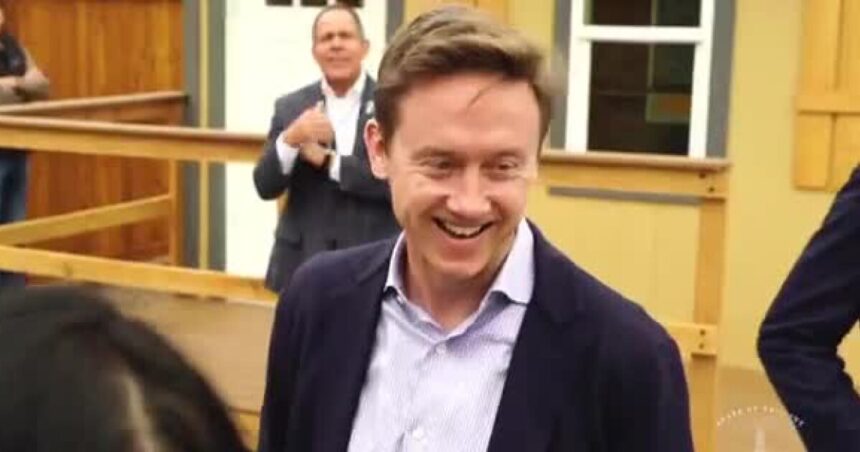DENVER — Exemplifying the way Denverites came together to help address an affordable housing crisis exacerbated by the arrival of thousands of immigrants from the southern border escaping violence last winter, Denver Mayor Mike Johnston in his first State of the City address touted the city’s response to both crises as he laid out the work his administration will do in the coming year to respond to a “larger ecosystem” that needs attention.
Breaking with tradition and speaking from the historic Paramount Theatre in downtown Denver Monday, Johnston said that while many cities across the country had given in or given up on the issue of homelessness, Denver saw another way.
In listening to neighbors at more than 60 town halls across the city after declaring a state of emergency over homelessness during his first day in office, Johnston said he heard from many people who just wanted to help.
“We believed that no one was unredeemable, and no problem was too big for a city committed to change,” Johnston said, as he lauded the city’s response to open up 1,200 units of transitional housing in 8 different council districts across the city with wraparound services for people in need.
As of Monday, Johnston said, Denver had moved more than 1,600 people off the streets and into transitional housing, saying his administration “has housed more people faster per capita than any city in America.”
Reiterating how his vision to end homelessness over the next four years now feels more possible than ever, Johnston announced that his goal to end veteran homelessness by end of year was well underway, saying Denver was on the path “to become the largest American city ever to end street homelessness for veterans.”
Denver
Denver mayor announces goal to eliminate veteran homelessness by end of year
1:23 PM, Jun 03, 2024
Alluding to mistakes the city has made in trying to accomplish his All In Mile High goals (previously known as the House1000 Initiative), Johnston told a crowded Paramount Theatre there is still much to be done in this respect, but that the work so far could be seen as “the blueprint for what our city can do.”
The mayor also touted his administration’s work in figuring out how to best help the thousands of immigrants arriving from the southern border as he took a jab at Texas Gov. Greg Abbott, “who thought these brave newcomers would challenge our humanity, would break us, would divide us.”
“In this crisis, Denver saw not problems but possibility,” Johnston said, as he articulated how city officials came together to form partnerships and how Denverites stepped up to help people in their greatest time of need. “It would have been easy to blame someone else, to give up or give in. But Denver did something different.”
Praising “the country’s first Asylum-Seekers Program,” Johnston also highlighted how Denver found a new path to get people “caught in a broken federal immigration system” to work so they can provide for their families as they sought a new beginning in a different country, with different rules and different customs to the ones they are used to.
The program, the mayor said, helps immigrants apply for asylum and as they wait for an appointment to get legal work authorization, the city helps them out with skills they need to get work in Denver, including learning English, developing financial literacy, and earn career certifications so they can “be ready to be hired the day their work authorization arrives.”
“Thanks to Denver’s indomitable spirit of service, this historic effort has meant that in Denver, the city that has welcomed more migrants per capita than any other city in America, we do not have a single encampment of migrant families living on the streets. We have helped families find their way to housing, work, and the dignity they deserve,” the mayor said.
“Our work is not done”
But the work to make Denver a better place to live is not done, Johnston added.
“The challenges I saw were not just homelessness, but a larger ecosystem that needed attention,” the mayor said, as he highlighted public safety, the need to build community and revitalize a struggling downtown as priorities for the year ahead.
In his speech, Johnston said the city has gotten to work on those issues, first by providing 700 young Denverites with job opportunities to prevent youth violence over the summer. Next, the mayor said, the city will hold 25 community events and pop-up activities “that bring joy and vibrancy to streets that could otherwise be dark and dangerous.”
On the issue of vehicle thefts, Johnston said the city has taken an aggressive approach to combat these types of crimes through license plate readers, easy vehicle registration, “enhanced deterrence” and swift investigation.
“We have started an office of neighborhood safety, to align all the services that make our community safe and vibrant without needing an officer, making it easier for communities to engage with city services without the pressure of a law enforcement contact,” the mayor said, adding the city will step up patrols in places where crime is high after data showed the presence of a patrol officer for just 10 minutes dramatically reduces the chance of a crime being committed in that area over the next couple of hours.
Arguing that the best way to fight crime is to build trust, the city will also start what Johnston called “trust patrols” — police officers who will walk into businesses or a rec center or a park to talk to people and find out what’s working, what isn’t, and what the city could be doing better.
Denver
Denver mayor reflects on progress in 1st year in office, what is next for Denver
5:24 PM, Jul 19, 2024
“By the end of next year, we will have run more than 6,000 trust patrols this year, and anyone who has a business or an event or a location can request them from the Denver Police Department website,” Johnston said, adding the initiative has already bore fruit with crime down across the board, including a 31% reduction in auto thefts, a 27% decrease in shootings and homicides and a similar reduction in property crime, according to the mayor.
Citing the city’s “selfless evidence” to be willing to serve when called to do so, Johnston also announced Denver’s “Give5 Mile High” initiative during his first State of the City address. The idea behind the initiative is simple: Denverities will be asked to give five hours of their time each month to serve the city and their neighbors.
“On the third Saturday of every month, we will host our Give5 Mile High service day. Our first service day will be August 17th, where we will partner with Denver Public Schools to ensure every child is ready to start school with the resources they need to succeed,” the mayor said.
In first city address, Mayor Johnston touts achievements while pitching affordable housing tax to voters
By September, the city will launch a city-wide clean-up day to “make sure every block of Denver is beautiful,” he added.
Calling downtown Denver “the living room for every Denverite and the playground for every Coloradan,” Johnston once again stressed the need to revitalize the downtown area, which saw a substantial loss of foot traffic at the onset of the coronavirus pandemic which has struggled to recover more than four years later.
It’s not clear how much of the $350,000 the mayor had earmarked for that purpose will go toward what he called the Vibrant Downtown campaign during his speech Monday, but Johnston vowed the investment will be “the largest ever without raising taxes.”
“We will use these resources to turn downtown from a central business district to a central neighborhood district, complete with affordable housing, public parks, childcare, great retail, restaurants, art and music and walkable activated streets where you can get lost in a vibrant world you can only find in Denver,” Johnston said, adding the catalyst for such success will be the reopening of the 16th St. Mall.
Mayor asks voters to approve affordable housing tax in November
Johnston said dreams of a vibrant Denver can only be possible if everyone is included — which isn’t the case for many Denverites worried about how they’ll make ends meet and wonder whethering they can remain the city at all, he said.
“If we want to keep the mom and the grandma and the college graduate in Denver we can, but we have to choose it and we have to fight for it,” the mayor said, as he asked voters to approve a new sales tax that would help pay for more affordable housing, but which would raise the city’s effective sales tax rate to nearly 10%, if approved.
Pitching the tax hike, mayor Johnston said the measure — funded by a half-penny sales tax — “would only cost Denver families about $2 a week, but it would put us on the path to bring on the 45,000 units of affordable housing we need to fill our entire gap of affordable housing over the next 10 years.”
“Finding a way to reverse the economic impacts of a global pandemic on our city center is hard, replacing cycles of violence with centers of joy is hard, living on the streets in a tent in a freezing Denver winter is hard, leaving everything you have and walking 3,000 miles with a nine-year-old to an unknown future is hard, and finding the resources and strategies to bring on enough housing to keep a growing city affordable is hard,” Johnston said.
Adding, in closing remarks that “if there is one thing we’ve learned in the past year, it is that the single hardest problem we will ever face, is the belief that we can’t solve these problems at all. Once we have defeated that, anything is possible.”
Coloradans making a difference | Denver7 featured videos
At Denver7, we’re committed to making a difference in our community. We’re standing up for what’s right by listening, lending a helping hand and following through on promises. See that work in action, in the featured videos in the playlist above.











